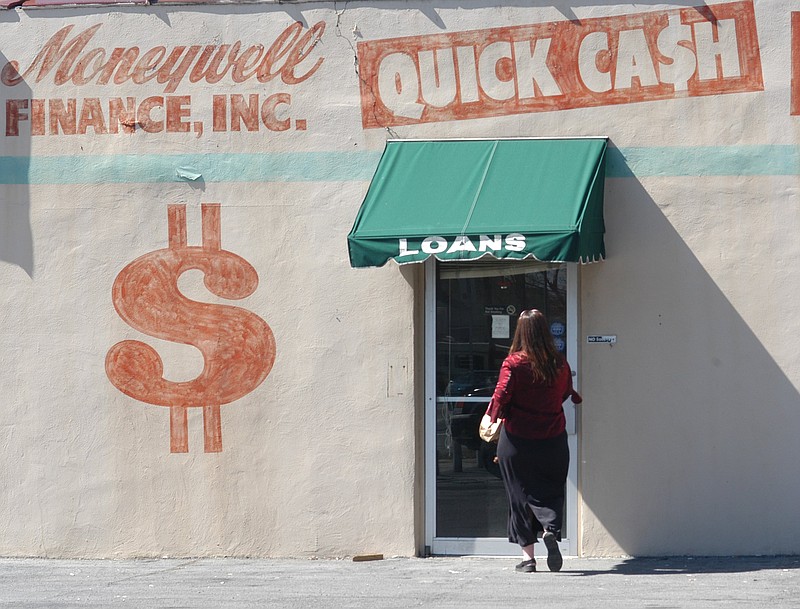Payday lenders often seem like the lesser of two evils when people have a sudden cash crisis. But all too often those payday lenders actually become payday leaner-day makers.
With Tennessee offering these loan sharks a wide-open field of essentially no regulation or limits, it's a good thing Chattanooga leaders are using zoning laws to prevent future neighborhood blighting by this parasitic industry that all too often sets up in communities already struggling with financial stress.
Read more
Payday plan draws industry protest Chattanooga seeks to limit payday lending and title pawns
The Chattanooga City Council recently passed a moratorium on new building permits for such businesses, but that didn't stop them from putting out a shingle on an empty storefront. So last Tuesday, the council passed on first reading a new proposed zoning change that would prevent such businesses from opening within 500 feet of residential areas or within a quarter-mile of similar lenders.
The proposed zoning, drafted by council members Russell Gilbert and Carol Berz, was prompted by the stretch of Brainerd Road that now has a dozen or more of such lenders within just a few blocks. The proposal will receive a second reading and consideration this week at Tuesday's council meeting.
Naturally, those in the industry are not happy. Jabo Covert, senior vice president of government affairs for Check Into Cash, the largest alternative finance company in Tennessee, told Chattanooga Times reporter Louie Brogdon that the city is "creating a solution without a problem."
Hardly.
Three of Check Into Cash's 1,100 U.S. stores already are in Chattanooga city limits, Covert acknowledged. What he didn't talk about is the proximity of the Brainerd Road payday-lender industry enclave to the Tennessee-Georgia state line about 5 miles away. It's no coincidence.
Unlike Tennessee, Georgia does limit payday lenders, and is among 15 states rated by the Pew Charitable Trust as one of 15 "restrictive" payday lender states -- those with no payday loan storefronts. Tennessee is one of 27 states rated by Pew as "permissive" states -- those that allow single-repayment loans with APRs of 391 percent or higher.
Yes, a 391 percent annual percentage rate.
Of course, that's not what payday lenders advertise, and that's not where the loans' lending rates start out. According to a story this week in New Republic, many payday lenders advertise a fee of $15 per $100 borrowed, which doesn't sound too bad compared to a credit card with a 24-percent APR. But here's the gimmick: The average borrower takes out a $375 two-week loan with a fee of $55, according to the Pew Charitable Trust's Safe Small-Dollar Loans Research Project. And borrowers are rarely able to pay back the loans in two weeks, so they "roll over" their loan by paying just the fee. Then the loan has effectively become a four-week, $375 loan with a $110 fee. Pew says the average borrower rolls over an average of eight times and pays $520 in fees on that $375 loan. A borrower who rolls over their loan for an entire year would pay $1,430 in fees -- an APR of 381 percent.
Aside from the parasitic nature of these businesses, they also may be magnets for crime, according to Chattanooga Mayor Andy Berke. On Sunday's Times Free Press Perspective page, Berke cited research from a 2009 stidy by George Washington University and California State University that established the presence of payday lenders in a neighborhood is directly associated with violent crime.
"Writing about the customers becoming easy marks for robberies, the researchers said that 'the availability of cash in distressed neighborhoods at readily identifiable businesses, often open during evening and weekend hours, suggests a probable link between crime, particularly violent crime, and payday lending,' " Berke stated.
Did we mention that these businesses -- unlike their neighbor businesses -- don't pay business taxes? That's because in Tennessee they are considered financial institutions. So even while they bleed Tennessee workers and blight our neighborhoods with increased crime, they pay nothing for our city's police protection.
From our perspective, the only problem with Chattanooga's zoning ordinance is that it's too little, too late. The payday loan businesses already up and running in the city are grandfathered in where they sit.
Still, Chattanooga's zoning proposal is far more consumer and community protection than the Hamilton County commission or the General Assembly of Tennessee have offered.
We urge Chattanooga's council to stay strong on the ordinance's second reading Tuesday.
We also hope other government officials -- especially in the Tennessee General Assembly -- will step up.
